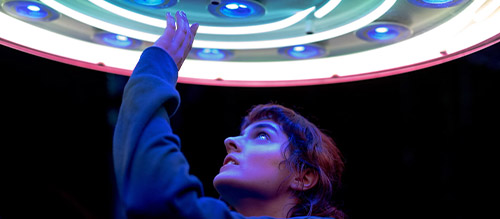Jumbo (2021) Review – GFF
Jumbo (2021)
Director: Zoé Wittock
Screenwriter: Zoé Wittock
Starring: Noémie Merlant, Emmanuelle Bercot, Bastien Bouillon
Oh, sure, a woman falling in love with a funfair ride sounds like a ludicrous subject matter for a feature film, but the truth is that plenty of us have experienced tenderness for an inanimate object. I’m talking, of course, about that plush toy from your childhood that you couldn’t imagine life without, or that perfectly shaped pillow sitting on your bed right now, which feels comforting to cuddle against come night time. Perhaps you even have a particular fondness for a painting, a good-sized coffee mug, a really good blusher, or maybe even your trusty but well-worn car? The point is that love manifests itself in many ways, and who are we to decide who or what a person can or can’t fall in love with?
The varying incarnations of love is an idea Zoé Wittock pushes to the extreme within her latest film, Jumbo. Jeanne (Noémie Merlant, Portrait of a Lady on Fire), a naive and timid young woman (lovingly nicknamed ‘Sugarpuss’ by her Mother), lands a job working maintenance at a funfair over the summer season, where she is introduced to a brand new attraction named ‘Move It’. ‘Attraction’ being the primary word here because Jeanne finds herself instantly infatuated with the imposingly large, metallic, futuristic-looking contraption – yes, in a sexual way. Competing for Jeanne’s affection is her boss Marc (Bastien Bouillon), but she is disinterested in getting to know him, having been so utterly enchanted by the bright lights and silent charms of the tilt-a-whirl ride she nicknames ‘Jumbo’.
Jeanne’s short, boffin haircut, whimsical searching eyes and affinity for building small-scale carnival attractions alone in her bedroom speaks to a noticeably unusual personality from the get-go. Besides her Mother, Margarette (Emmanuelle Bercot), Jeanne doesn’t seem to have a single friend or person to count on. There’s no Father figure and certainly no evidence of past boyfriends or romantic love interests. That is until she’s introduced to Jumbo of course, who finds a way to seduce Jeanne with his pulsating lights and large, stiff appendages. Jumbo’s entire purpose is to give others pleasure, and ‘his’ night-time entanglements with Jeanne are no less of a thrill-ride than his day job. Their relationship kicks up a gear when the pair find a way to communicate with one another – Jumbo flashes green for yes and red for no – doing so as reluctantly and shyly as a teenager consumed by infatuation. However, the other objects in Jeanne’s life are always getting in the way of the pair’s romance: a ringing mobile phone almost causes her to fall from Jumbo and to her death, the ride – just as big, powerful and strong as any buff superhero – swooping in, just in the nick of time, to rescue the damsel in distress from danger.
Eventually, the pair even find a way to consummate their relationship: Jumbo’s leaking oils caress every single part of Jeanne’s body, bringing her to climax as she writhes around in his liquid embrace. Kudos to cinematographer Thomas Buelens, who manages to gift a tender eroticism to scenes of Jeanne eagerly dipping her tongue into great black puddles of Jumbo’s freshly secreted fluids. However, her sex life aside, the most interesting thing about Jeanne is her complete refusal to hide or even be ashamed of her unusual relationship – it’s as if the very thought never even occurs to her. She introduces Jumbo to her Mother, who seems to be the only other significant person in her life. Having pushed Jeanne to put herself out there and meet someone, Margarette arrives at the funfair with three champagne glasses, expecting to meet Marc or another flesh-based young man. However, she ends up twirling through the air in the arms of her daughter’s steal-bunned lover.
The lack of men in Jeanne’s life might shed some light on her objectophilia (the act of falling in love with an inanimate object—which is completely real, by the way. Check out that episode of “My Strange Addiction” where that one guy is in a relationship with several of his pool inflatables). The subject of Jeanne’s absent father floats around the surface of the film. In fact, at one point, Margarette suggests that her vibrator would have made a better Father to Jeanne than the man who so cruelly abandoned her as a child. So, it should probably have come as less of a surprise for her to learn that no mere mortal could satisfy Jeanne’s appetite for mechanical stimulation. However, we might also read the film as an allegory of the queer experience or the feeling of ‘otherness’ from the accepted heterosexual understanding of romantic love and relationships. Jeanne defends her feelings to Margarette and Marc, who, refusing to see things from Jeanne’s point of view, conspire to have her committed to an institution for medical evaluation. Also, Jeanne certainly physically appears to be someone discovering her urges and allowing herself to experiment by bravely wandering outside of what society considers normal. Yet, as we know, there are very few actual definitions of what ‘normal’ actually is; love is love regardless of gender, or in this case, mortality.
Aside from some underdeveloped distractions – a random group of teenage boys crop up now and again to bully Jeanne as if she is an unpopular adolescent girl – Wittock’s Jumbo is a surefooted, strangely erotic endeavour. Most notedly, Noémie Merlant, Portrait of a Lady on Fire’s breakout star, once again makes moves to solidify her place on the roster of exciting, new European talent.
Jumbo is an extraordinarily original concept that is sure to take you on a thrilling adrenaline ride through the wildest depths of your sexuality.
18/24


